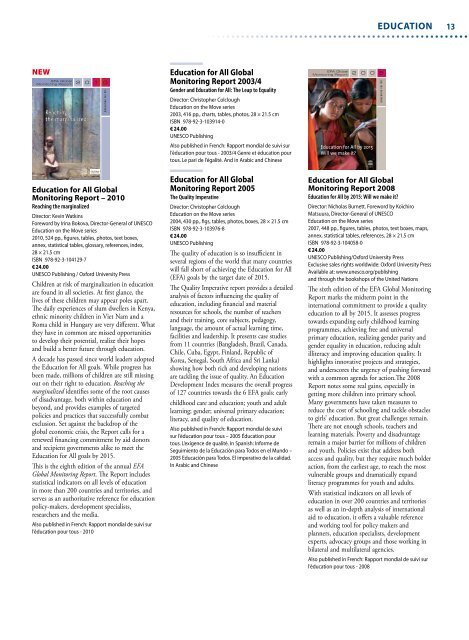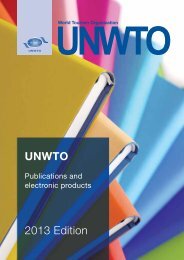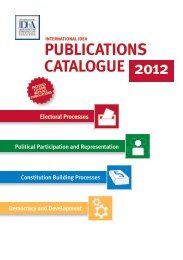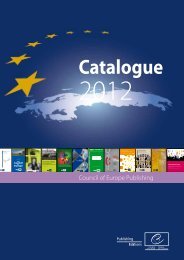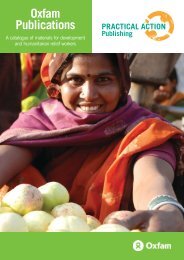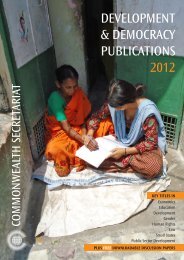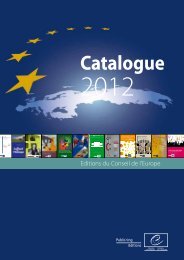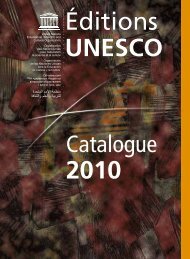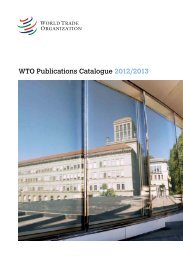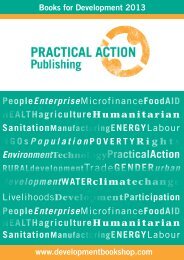UNESCO 2010/11 - Renouf Publishing Co. Ltd.
UNESCO 2010/11 - Renouf Publishing Co. Ltd.
UNESCO 2010/11 - Renouf Publishing Co. Ltd.
Create successful ePaper yourself
Turn your PDF publications into a flip-book with our unique Google optimized e-Paper software.
EDUCATION<br />
13<br />
NEW<br />
EFA Global<br />
Monitoring Report<br />
2<br />
Reaching<br />
the marginalized<br />
0 1 0<br />
Education for All Global<br />
Monitoring Report – <strong>2010</strong><br />
Reaching the marginalized<br />
Director: Kevin Watkins<br />
Foreword by Irina Bokova, Director-General of <strong>UNESCO</strong><br />
Education on the Move series<br />
<strong>2010</strong>, 524 pp., figures, tables, photos, text boxes,<br />
annex, statistical tables, glossary, references, index,<br />
28 × 21.5 cm<br />
ISBN 978-92-3-104129-7<br />
€ 24.00<br />
<strong>UNESCO</strong> <strong>Publishing</strong> / Oxford University Press<br />
Children at risk of marginalization in education<br />
are found in all societies. At first glance, the<br />
lives of these children may appear poles apart.<br />
The daily experiences of slum dwellers in Kenya,<br />
ethnic minority children in Viet Nam and a<br />
Roma child in Hungary are very different. What<br />
they have in common are missed opportunities<br />
to develop their potential, realize their hopes<br />
and build a better future through education.<br />
A decade has passed since world leaders adopted<br />
the Education for All goals. While progress has<br />
been made, millions of children are still missing<br />
out on their right to education. Reaching the<br />
marginalized identifies some of the root causes<br />
of disadvantage, both within education and<br />
beyond, and provides examples of targeted<br />
policies and practices that successfully combat<br />
exclusion. Set against the backdrop of the<br />
global economic crisis, the Report calls for a<br />
renewed financing commitment by aid donors<br />
and recipient governments alike to meet the<br />
Education for All goals by 2015.<br />
This is the eighth edition of the annual EFA<br />
Global Monitoring Report. The Report includes<br />
statistical indicators on all levels of education<br />
in more than 200 countries and territories, and<br />
serves as an authoritative reference for education<br />
policy-makers, development specialists,<br />
researchers and the media.<br />
Also published in French: Rapport mondial de suivi sur<br />
l’éducation pour tous - <strong>2010</strong><br />
Education for All<br />
Education for All Global<br />
Monitoring Report 2003/4<br />
Gender and Education for All: The Leap to Equality<br />
Director: Christopher <strong>Co</strong>lclough<br />
Education on the Move series<br />
2003, 416 pp., charts, tables, photos, 28 × 21.5 cm<br />
ISBN 978-92-3-103914-0<br />
€ 24.00<br />
<strong>UNESCO</strong> <strong>Publishing</strong><br />
Also published in French: Rapport mondial de suivi sur<br />
l’éducation pour tous - 2003/4 Genre et éducation pour<br />
tous. Le pari de l’égalité. And in Arabic and Chinese<br />
Education for All Global<br />
Monitoring Report 2005<br />
The Quality Imperative<br />
Director: Christopher <strong>Co</strong>lclough<br />
Education on the Move series<br />
2004, 430 pp., figs, tables, photos, boxes, 28 × 21.5 cm<br />
ISBN 978-92-3-103976-8<br />
€ 24.00<br />
<strong>UNESCO</strong> <strong>Publishing</strong><br />
The quality of education is so insufficient in<br />
several regions of the world that many countries<br />
will fall short of achieving the Education for All<br />
(EFA) goals by the target date of 2015.<br />
The Quality Imperative report provides a detailed<br />
analysis of factors influencing the quality of<br />
education, including financial and material<br />
resources for schools, the number of teachers<br />
and their training, core subjects, pedagogy,<br />
language, the amount of actual learning time,<br />
facilities and leadership. It presents case studies<br />
from <strong>11</strong> countries (Bangladesh, Brazil, Canada,<br />
Chile, Cuba, Egypt, Finland, Republic of<br />
Korea, Senegal, South Africa and Sri Lanka)<br />
showing how both rich and developing nations<br />
are tackling the issue of quality. An Education<br />
Development Index measures the overall progress<br />
of 127 countries towards the 6 EFA goals: early<br />
childhood care and education; youth and adult<br />
learning; gender; universal primary education;<br />
literacy, and quality of education.<br />
Also published in French: Rapport mondial de suivi<br />
sur l’éducation pour tous – 2005 Éducation pour<br />
tous. L’exigence de qualité. In Spanish: Informe de<br />
Seguimiento de la Educación para Todos en el Mundo –<br />
2005 Educación para Todos. El imperativo de la calidad.<br />
In Arabic and Chinese<br />
EFA Global<br />
Monitoring Report<br />
2 0 0 8<br />
Education for All by 2015<br />
Will we make it?<br />
Education for All Global<br />
Monitoring Report 2008<br />
Education for All by 2015: Will we make it?<br />
Director: Nicholas Burnett. Foreword by Koïchiro<br />
Matsuura, Director-General of <strong>UNESCO</strong><br />
Education on the Move series<br />
2007, 448 pp., figures, tables, photos, text boxes, maps,<br />
annex, statistical tables, references, 28 × 21.5 cm<br />
ISBN 978-92-3-104058-0<br />
€ 24.00<br />
<strong>UNESCO</strong> <strong>Publishing</strong>/Oxford University Press<br />
Exclusive sales rights worldwide: Oxford University Press<br />
Available at: www.unesco.org/publishing<br />
and through the bookshops of the United Nations<br />
The sixth edition of the EFA Global Monitoring<br />
Report marks the midterm point in the<br />
international commitment to provide a quality<br />
education to all by 2015. It assesses progress<br />
towards expanding early childhood learning<br />
programmes, achieving free and universal<br />
primary education, realizing gender parity and<br />
gender equality in education, reducing adult<br />
illiteracy and improving education quality. It<br />
highlights innovative projects and strategies,<br />
and underscores the urgency of pushing forward<br />
with a common agenda for action.The 2008<br />
Report notes some real gains, especially in<br />
getting more children into primary school.<br />
Many governments have taken measures to<br />
reduce the cost of schooling and tackle obstacles<br />
to girls’ education. But great challenges remain.<br />
There are not enough schools, teachers and<br />
learning materials. Poverty and disadvantage<br />
remain a major barrier for millions of children<br />
and youth. Policies exist that address both<br />
access and quality, but they require much bolder<br />
action, from the earliest age, to reach the most<br />
vulnerable groups and dramatically expand<br />
literacy programmes for youth and adults.<br />
With statistical indicators on all levels of<br />
education in over 200 countries and territories<br />
as well as an in-depth analysis of international<br />
aid to education, it offers a valuable reference<br />
and working tool for policy makers and<br />
planners, education specialists, development<br />
experts, advocacy groups and those working in<br />
bilateral and multilateral agencies.<br />
Also published in French: Rapport mondial de suivi sur<br />
l’éducation pour tous - 2008<br />
Education for All


